Analyzing Ethical and Legal Issues in Child and Family Health Cases
VerifiedAdded on 2022/08/17
|9
|2288
|76
Case Study
AI Summary
This assignment presents three case studies focusing on child and family health, exploring ethical and legal dilemmas encountered by nurses. The first case involves a 6-week-old infant whose parents refuse vaccination, raising questions about parental rights versus the nurse's obligation to provide safe care, informed consent, and the role of the NMBA guidelines. The second case examines a 15-year-old girl with Chlamydia, addressing issues of adolescent consent, confidentiality, and the nurse's responsibility to provide care within legal and ethical boundaries, considering the limitations of her age and legal requirements. The final case presents a year 6 student affected by domestic abuse, prompting considerations of mandatory reporting laws, the impact of witnessing abuse, and the nurse's role in supporting the child and family, considering the NMBA Decision Making framework. Each case study provides detailed analysis, references to relevant legislation, and ethical guidelines to aid students in understanding the complexities of healthcare practice.
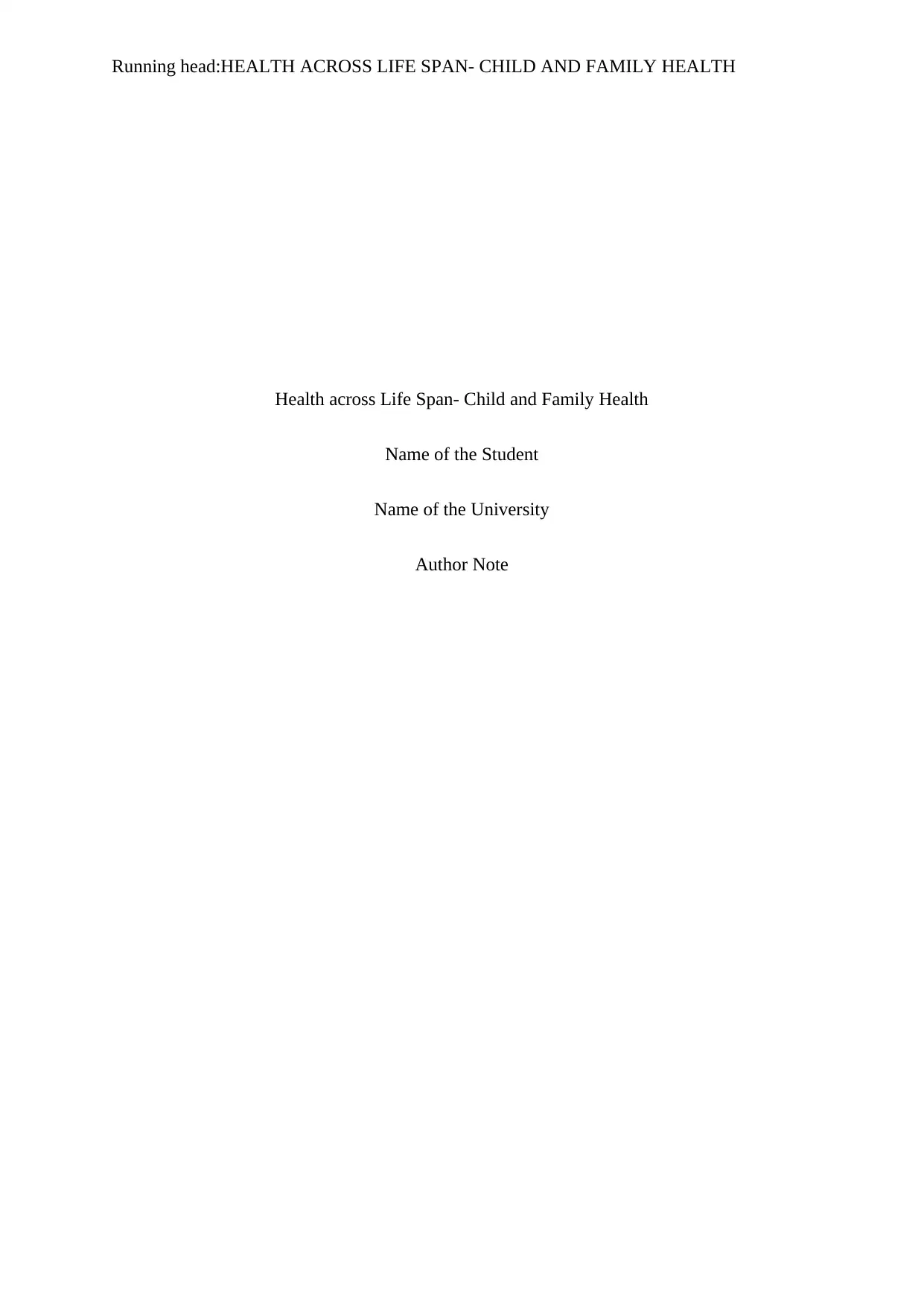
Running head:HEALTH ACROSS LIFE SPAN- CHILD AND FAMILY HEALTH
Health across Life Span- Child and Family Health
Name of the Student
Name of the University
Author Note
Health across Life Span- Child and Family Health
Name of the Student
Name of the University
Author Note
Paraphrase This Document
Need a fresh take? Get an instant paraphrase of this document with our AI Paraphraser
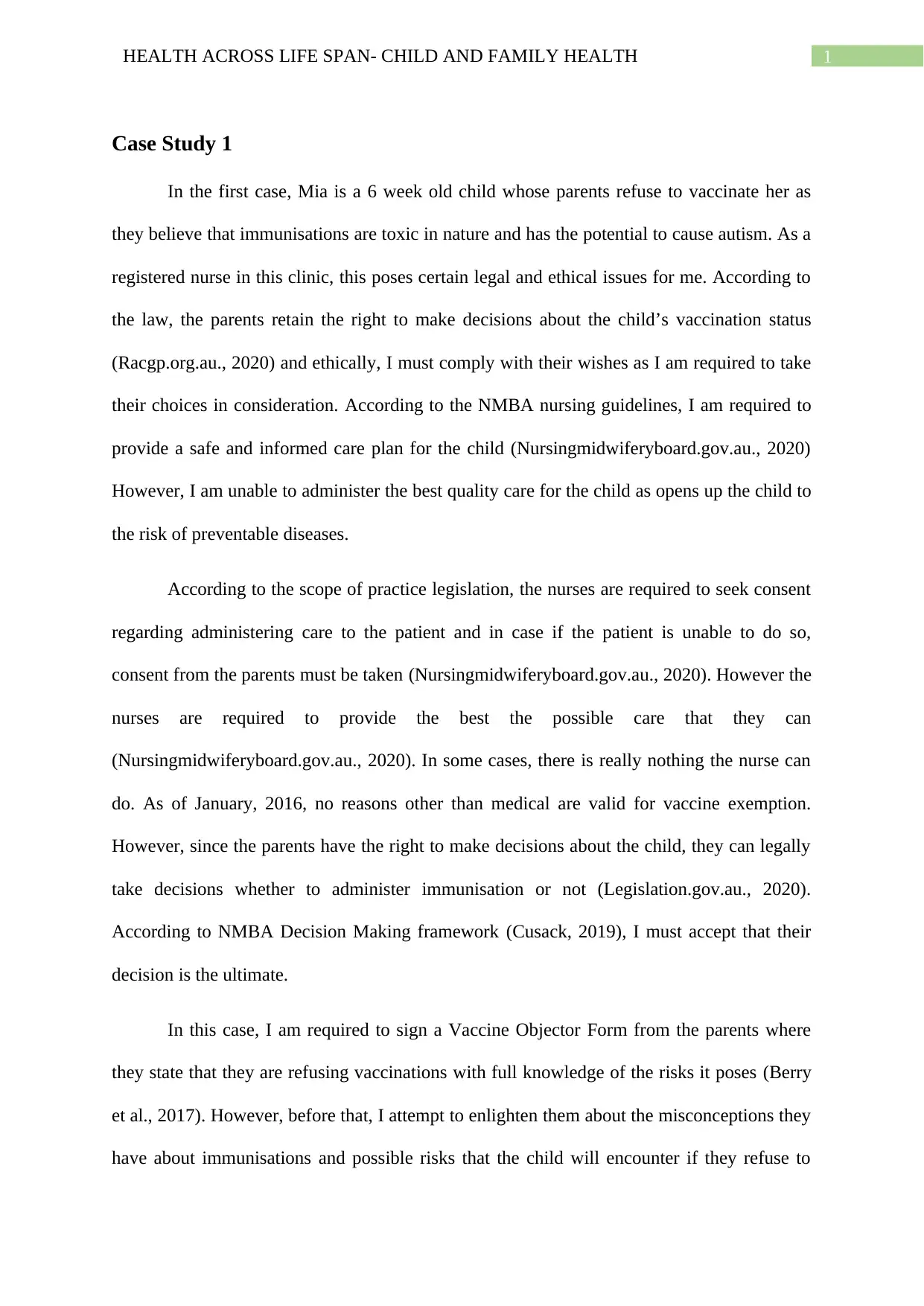
1HEALTH ACROSS LIFE SPAN- CHILD AND FAMILY HEALTH
Case Study 1
In the first case, Mia is a 6 week old child whose parents refuse to vaccinate her as
they believe that immunisations are toxic in nature and has the potential to cause autism. As a
registered nurse in this clinic, this poses certain legal and ethical issues for me. According to
the law, the parents retain the right to make decisions about the child’s vaccination status
(Racgp.org.au., 2020) and ethically, I must comply with their wishes as I am required to take
their choices in consideration. According to the NMBA nursing guidelines, I am required to
provide a safe and informed care plan for the child (Nursingmidwiferyboard.gov.au., 2020)
However, I am unable to administer the best quality care for the child as opens up the child to
the risk of preventable diseases.
According to the scope of practice legislation, the nurses are required to seek consent
regarding administering care to the patient and in case if the patient is unable to do so,
consent from the parents must be taken (Nursingmidwiferyboard.gov.au., 2020). However the
nurses are required to provide the best the possible care that they can
(Nursingmidwiferyboard.gov.au., 2020). In some cases, there is really nothing the nurse can
do. As of January, 2016, no reasons other than medical are valid for vaccine exemption.
However, since the parents have the right to make decisions about the child, they can legally
take decisions whether to administer immunisation or not (Legislation.gov.au., 2020).
According to NMBA Decision Making framework (Cusack, 2019), I must accept that their
decision is the ultimate.
In this case, I am required to sign a Vaccine Objector Form from the parents where
they state that they are refusing vaccinations with full knowledge of the risks it poses (Berry
et al., 2017). However, before that, I attempt to enlighten them about the misconceptions they
have about immunisations and possible risks that the child will encounter if they refuse to
Case Study 1
In the first case, Mia is a 6 week old child whose parents refuse to vaccinate her as
they believe that immunisations are toxic in nature and has the potential to cause autism. As a
registered nurse in this clinic, this poses certain legal and ethical issues for me. According to
the law, the parents retain the right to make decisions about the child’s vaccination status
(Racgp.org.au., 2020) and ethically, I must comply with their wishes as I am required to take
their choices in consideration. According to the NMBA nursing guidelines, I am required to
provide a safe and informed care plan for the child (Nursingmidwiferyboard.gov.au., 2020)
However, I am unable to administer the best quality care for the child as opens up the child to
the risk of preventable diseases.
According to the scope of practice legislation, the nurses are required to seek consent
regarding administering care to the patient and in case if the patient is unable to do so,
consent from the parents must be taken (Nursingmidwiferyboard.gov.au., 2020). However the
nurses are required to provide the best the possible care that they can
(Nursingmidwiferyboard.gov.au., 2020). In some cases, there is really nothing the nurse can
do. As of January, 2016, no reasons other than medical are valid for vaccine exemption.
However, since the parents have the right to make decisions about the child, they can legally
take decisions whether to administer immunisation or not (Legislation.gov.au., 2020).
According to NMBA Decision Making framework (Cusack, 2019), I must accept that their
decision is the ultimate.
In this case, I am required to sign a Vaccine Objector Form from the parents where
they state that they are refusing vaccinations with full knowledge of the risks it poses (Berry
et al., 2017). However, before that, I attempt to enlighten them about the misconceptions they
have about immunisations and possible risks that the child will encounter if they refuse to
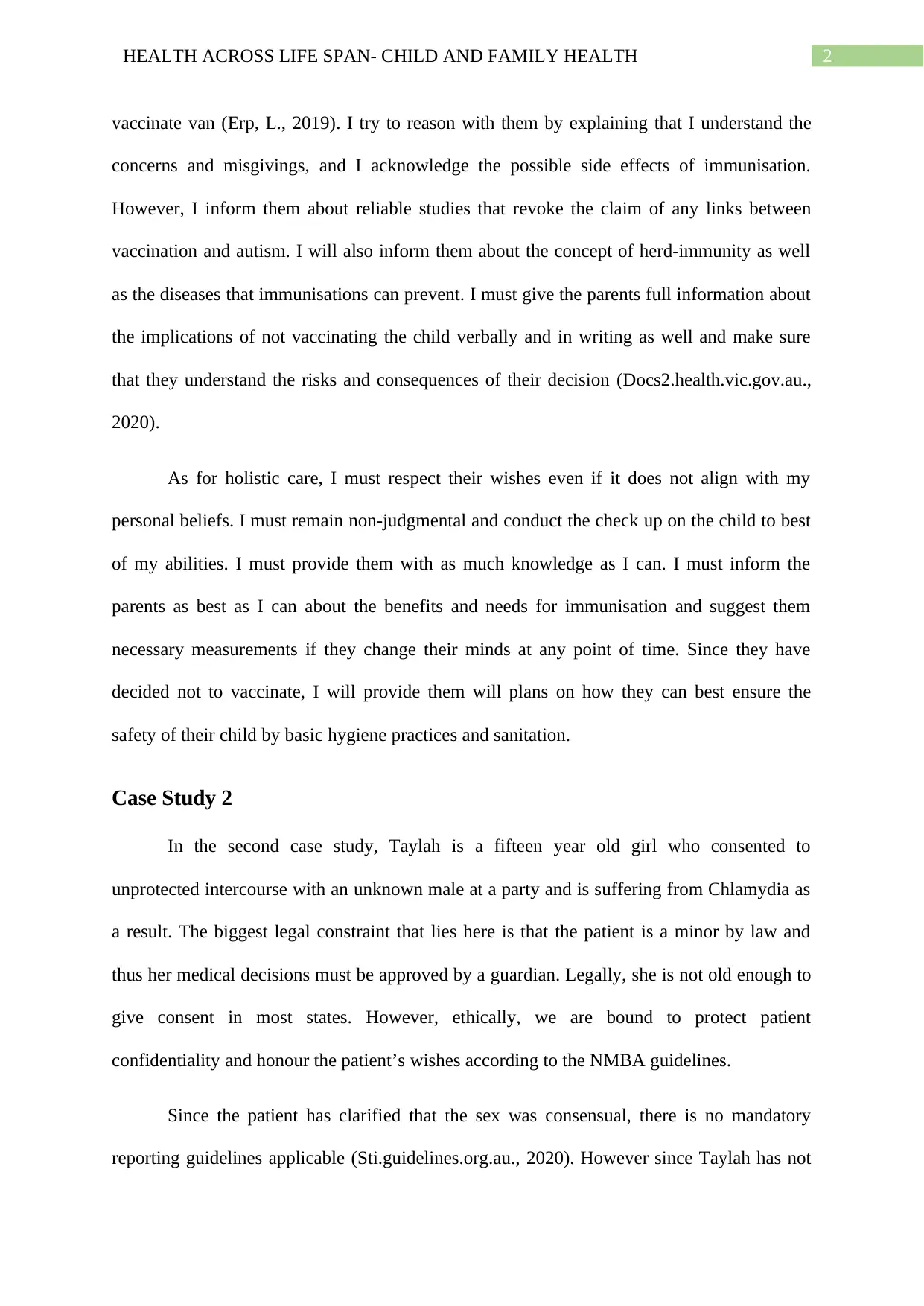
2HEALTH ACROSS LIFE SPAN- CHILD AND FAMILY HEALTH
vaccinate van (Erp, L., 2019). I try to reason with them by explaining that I understand the
concerns and misgivings, and I acknowledge the possible side effects of immunisation.
However, I inform them about reliable studies that revoke the claim of any links between
vaccination and autism. I will also inform them about the concept of herd-immunity as well
as the diseases that immunisations can prevent. I must give the parents full information about
the implications of not vaccinating the child verbally and in writing as well and make sure
that they understand the risks and consequences of their decision (Docs2.health.vic.gov.au.,
2020).
As for holistic care, I must respect their wishes even if it does not align with my
personal beliefs. I must remain non-judgmental and conduct the check up on the child to best
of my abilities. I must provide them with as much knowledge as I can. I must inform the
parents as best as I can about the benefits and needs for immunisation and suggest them
necessary measurements if they change their minds at any point of time. Since they have
decided not to vaccinate, I will provide them will plans on how they can best ensure the
safety of their child by basic hygiene practices and sanitation.
Case Study 2
In the second case study, Taylah is a fifteen year old girl who consented to
unprotected intercourse with an unknown male at a party and is suffering from Chlamydia as
a result. The biggest legal constraint that lies here is that the patient is a minor by law and
thus her medical decisions must be approved by a guardian. Legally, she is not old enough to
give consent in most states. However, ethically, we are bound to protect patient
confidentiality and honour the patient’s wishes according to the NMBA guidelines.
Since the patient has clarified that the sex was consensual, there is no mandatory
reporting guidelines applicable (Sti.guidelines.org.au., 2020). However since Taylah has not
vaccinate van (Erp, L., 2019). I try to reason with them by explaining that I understand the
concerns and misgivings, and I acknowledge the possible side effects of immunisation.
However, I inform them about reliable studies that revoke the claim of any links between
vaccination and autism. I will also inform them about the concept of herd-immunity as well
as the diseases that immunisations can prevent. I must give the parents full information about
the implications of not vaccinating the child verbally and in writing as well and make sure
that they understand the risks and consequences of their decision (Docs2.health.vic.gov.au.,
2020).
As for holistic care, I must respect their wishes even if it does not align with my
personal beliefs. I must remain non-judgmental and conduct the check up on the child to best
of my abilities. I must provide them with as much knowledge as I can. I must inform the
parents as best as I can about the benefits and needs for immunisation and suggest them
necessary measurements if they change their minds at any point of time. Since they have
decided not to vaccinate, I will provide them will plans on how they can best ensure the
safety of their child by basic hygiene practices and sanitation.
Case Study 2
In the second case study, Taylah is a fifteen year old girl who consented to
unprotected intercourse with an unknown male at a party and is suffering from Chlamydia as
a result. The biggest legal constraint that lies here is that the patient is a minor by law and
thus her medical decisions must be approved by a guardian. Legally, she is not old enough to
give consent in most states. However, ethically, we are bound to protect patient
confidentiality and honour the patient’s wishes according to the NMBA guidelines.
Since the patient has clarified that the sex was consensual, there is no mandatory
reporting guidelines applicable (Sti.guidelines.org.au., 2020). However since Taylah has not
⊘ This is a preview!⊘
Do you want full access?
Subscribe today to unlock all pages.

Trusted by 1+ million students worldwide
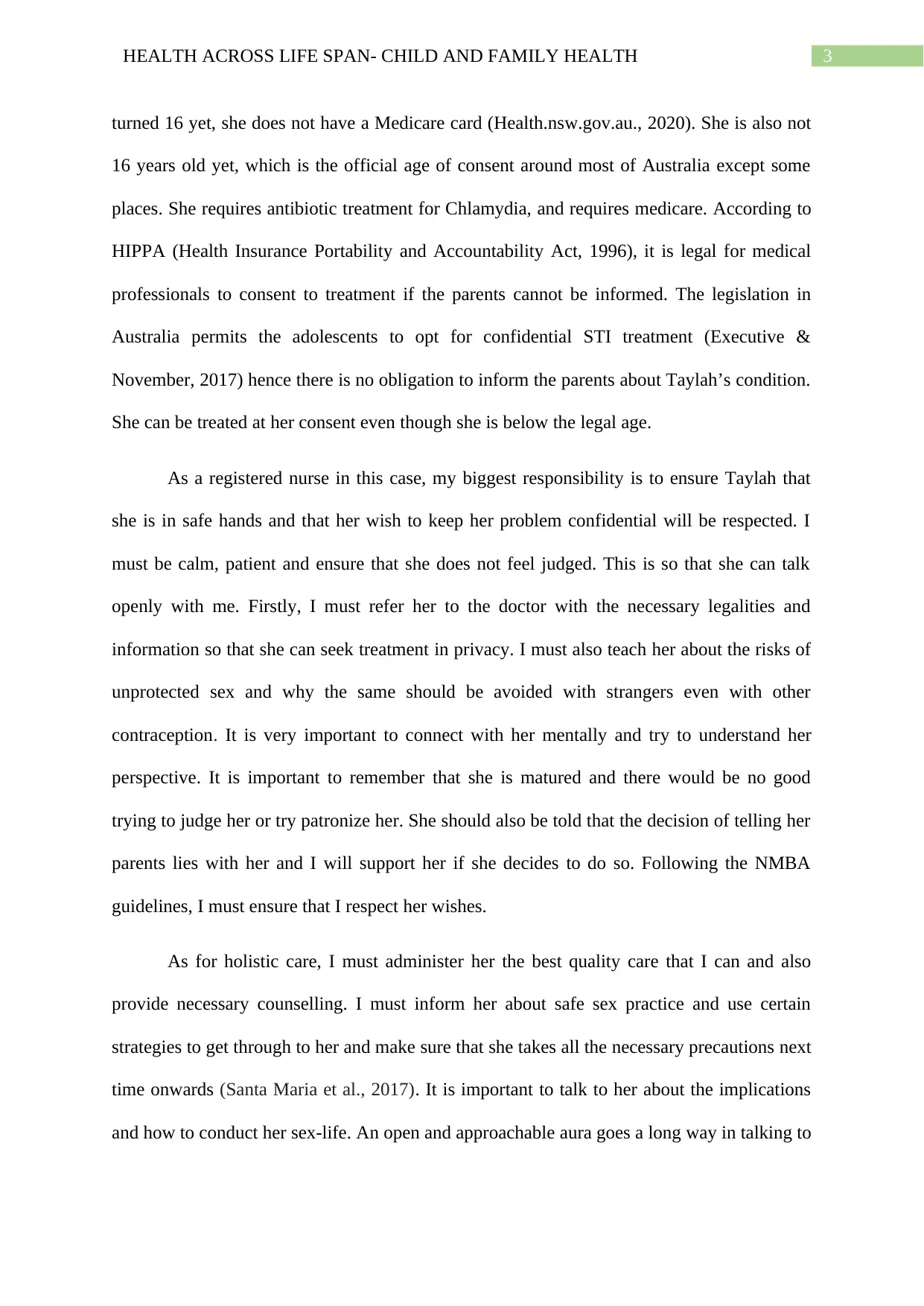
3HEALTH ACROSS LIFE SPAN- CHILD AND FAMILY HEALTH
turned 16 yet, she does not have a Medicare card (Health.nsw.gov.au., 2020). She is also not
16 years old yet, which is the official age of consent around most of Australia except some
places. She requires antibiotic treatment for Chlamydia, and requires medicare. According to
HIPPA (Health Insurance Portability and Accountability Act, 1996), it is legal for medical
professionals to consent to treatment if the parents cannot be informed. The legislation in
Australia permits the adolescents to opt for confidential STI treatment (Executive &
November, 2017) hence there is no obligation to inform the parents about Taylah’s condition.
She can be treated at her consent even though she is below the legal age.
As a registered nurse in this case, my biggest responsibility is to ensure Taylah that
she is in safe hands and that her wish to keep her problem confidential will be respected. I
must be calm, patient and ensure that she does not feel judged. This is so that she can talk
openly with me. Firstly, I must refer her to the doctor with the necessary legalities and
information so that she can seek treatment in privacy. I must also teach her about the risks of
unprotected sex and why the same should be avoided with strangers even with other
contraception. It is very important to connect with her mentally and try to understand her
perspective. It is important to remember that she is matured and there would be no good
trying to judge her or try patronize her. She should also be told that the decision of telling her
parents lies with her and I will support her if she decides to do so. Following the NMBA
guidelines, I must ensure that I respect her wishes.
As for holistic care, I must administer her the best quality care that I can and also
provide necessary counselling. I must inform her about safe sex practice and use certain
strategies to get through to her and make sure that she takes all the necessary precautions next
time onwards (Santa Maria et al., 2017). It is important to talk to her about the implications
and how to conduct her sex-life. An open and approachable aura goes a long way in talking to
turned 16 yet, she does not have a Medicare card (Health.nsw.gov.au., 2020). She is also not
16 years old yet, which is the official age of consent around most of Australia except some
places. She requires antibiotic treatment for Chlamydia, and requires medicare. According to
HIPPA (Health Insurance Portability and Accountability Act, 1996), it is legal for medical
professionals to consent to treatment if the parents cannot be informed. The legislation in
Australia permits the adolescents to opt for confidential STI treatment (Executive &
November, 2017) hence there is no obligation to inform the parents about Taylah’s condition.
She can be treated at her consent even though she is below the legal age.
As a registered nurse in this case, my biggest responsibility is to ensure Taylah that
she is in safe hands and that her wish to keep her problem confidential will be respected. I
must be calm, patient and ensure that she does not feel judged. This is so that she can talk
openly with me. Firstly, I must refer her to the doctor with the necessary legalities and
information so that she can seek treatment in privacy. I must also teach her about the risks of
unprotected sex and why the same should be avoided with strangers even with other
contraception. It is very important to connect with her mentally and try to understand her
perspective. It is important to remember that she is matured and there would be no good
trying to judge her or try patronize her. She should also be told that the decision of telling her
parents lies with her and I will support her if she decides to do so. Following the NMBA
guidelines, I must ensure that I respect her wishes.
As for holistic care, I must administer her the best quality care that I can and also
provide necessary counselling. I must inform her about safe sex practice and use certain
strategies to get through to her and make sure that she takes all the necessary precautions next
time onwards (Santa Maria et al., 2017). It is important to talk to her about the implications
and how to conduct her sex-life. An open and approachable aura goes a long way in talking to
Paraphrase This Document
Need a fresh take? Get an instant paraphrase of this document with our AI Paraphraser
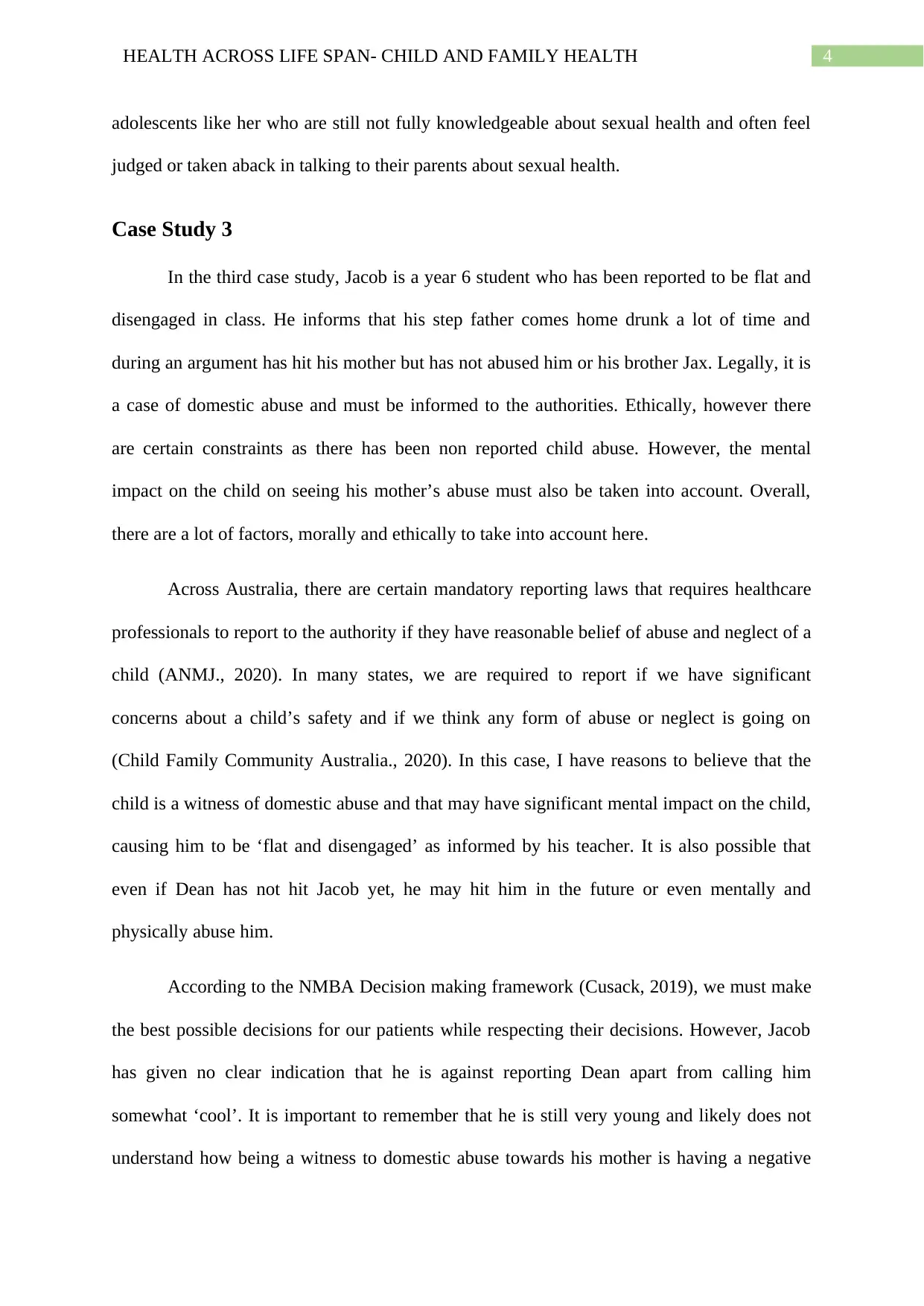
4HEALTH ACROSS LIFE SPAN- CHILD AND FAMILY HEALTH
adolescents like her who are still not fully knowledgeable about sexual health and often feel
judged or taken aback in talking to their parents about sexual health.
Case Study 3
In the third case study, Jacob is a year 6 student who has been reported to be flat and
disengaged in class. He informs that his step father comes home drunk a lot of time and
during an argument has hit his mother but has not abused him or his brother Jax. Legally, it is
a case of domestic abuse and must be informed to the authorities. Ethically, however there
are certain constraints as there has been non reported child abuse. However, the mental
impact on the child on seeing his mother’s abuse must also be taken into account. Overall,
there are a lot of factors, morally and ethically to take into account here.
Across Australia, there are certain mandatory reporting laws that requires healthcare
professionals to report to the authority if they have reasonable belief of abuse and neglect of a
child (ANMJ., 2020). In many states, we are required to report if we have significant
concerns about a child’s safety and if we think any form of abuse or neglect is going on
(Child Family Community Australia., 2020). In this case, I have reasons to believe that the
child is a witness of domestic abuse and that may have significant mental impact on the child,
causing him to be ‘flat and disengaged’ as informed by his teacher. It is also possible that
even if Dean has not hit Jacob yet, he may hit him in the future or even mentally and
physically abuse him.
According to the NMBA Decision making framework (Cusack, 2019), we must make
the best possible decisions for our patients while respecting their decisions. However, Jacob
has given no clear indication that he is against reporting Dean apart from calling him
somewhat ‘cool’. It is important to remember that he is still very young and likely does not
understand how being a witness to domestic abuse towards his mother is having a negative
adolescents like her who are still not fully knowledgeable about sexual health and often feel
judged or taken aback in talking to their parents about sexual health.
Case Study 3
In the third case study, Jacob is a year 6 student who has been reported to be flat and
disengaged in class. He informs that his step father comes home drunk a lot of time and
during an argument has hit his mother but has not abused him or his brother Jax. Legally, it is
a case of domestic abuse and must be informed to the authorities. Ethically, however there
are certain constraints as there has been non reported child abuse. However, the mental
impact on the child on seeing his mother’s abuse must also be taken into account. Overall,
there are a lot of factors, morally and ethically to take into account here.
Across Australia, there are certain mandatory reporting laws that requires healthcare
professionals to report to the authority if they have reasonable belief of abuse and neglect of a
child (ANMJ., 2020). In many states, we are required to report if we have significant
concerns about a child’s safety and if we think any form of abuse or neglect is going on
(Child Family Community Australia., 2020). In this case, I have reasons to believe that the
child is a witness of domestic abuse and that may have significant mental impact on the child,
causing him to be ‘flat and disengaged’ as informed by his teacher. It is also possible that
even if Dean has not hit Jacob yet, he may hit him in the future or even mentally and
physically abuse him.
According to the NMBA Decision making framework (Cusack, 2019), we must make
the best possible decisions for our patients while respecting their decisions. However, Jacob
has given no clear indication that he is against reporting Dean apart from calling him
somewhat ‘cool’. It is important to remember that he is still very young and likely does not
understand how being a witness to domestic abuse towards his mother is having a negative
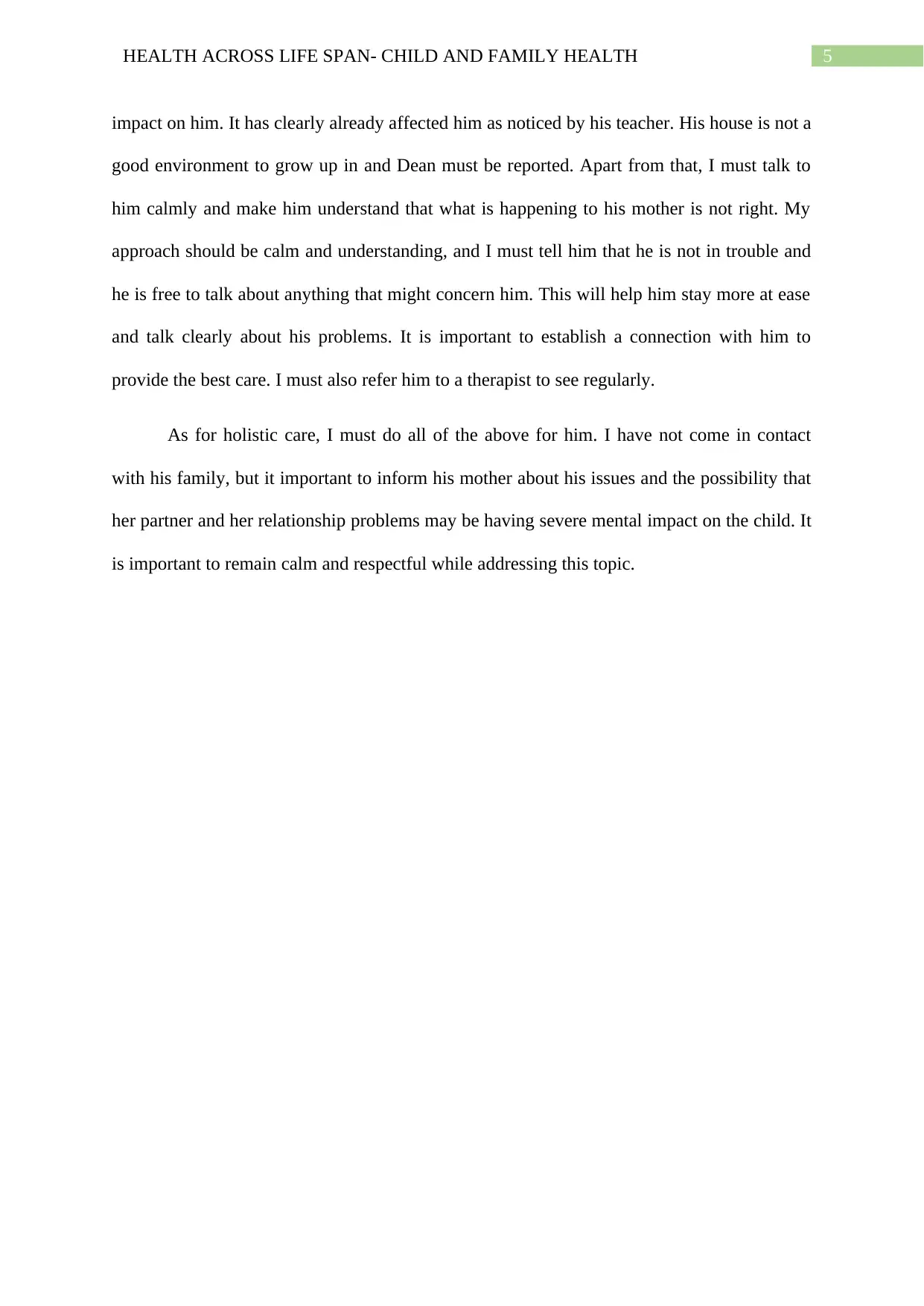
5HEALTH ACROSS LIFE SPAN- CHILD AND FAMILY HEALTH
impact on him. It has clearly already affected him as noticed by his teacher. His house is not a
good environment to grow up in and Dean must be reported. Apart from that, I must talk to
him calmly and make him understand that what is happening to his mother is not right. My
approach should be calm and understanding, and I must tell him that he is not in trouble and
he is free to talk about anything that might concern him. This will help him stay more at ease
and talk clearly about his problems. It is important to establish a connection with him to
provide the best care. I must also refer him to a therapist to see regularly.
As for holistic care, I must do all of the above for him. I have not come in contact
with his family, but it important to inform his mother about his issues and the possibility that
her partner and her relationship problems may be having severe mental impact on the child. It
is important to remain calm and respectful while addressing this topic.
impact on him. It has clearly already affected him as noticed by his teacher. His house is not a
good environment to grow up in and Dean must be reported. Apart from that, I must talk to
him calmly and make him understand that what is happening to his mother is not right. My
approach should be calm and understanding, and I must tell him that he is not in trouble and
he is free to talk about anything that might concern him. This will help him stay more at ease
and talk clearly about his problems. It is important to establish a connection with him to
provide the best care. I must also refer him to a therapist to see regularly.
As for holistic care, I must do all of the above for him. I have not come in contact
with his family, but it important to inform his mother about his issues and the possibility that
her partner and her relationship problems may be having severe mental impact on the child. It
is important to remain calm and respectful while addressing this topic.
⊘ This is a preview!⊘
Do you want full access?
Subscribe today to unlock all pages.

Trusted by 1+ million students worldwide
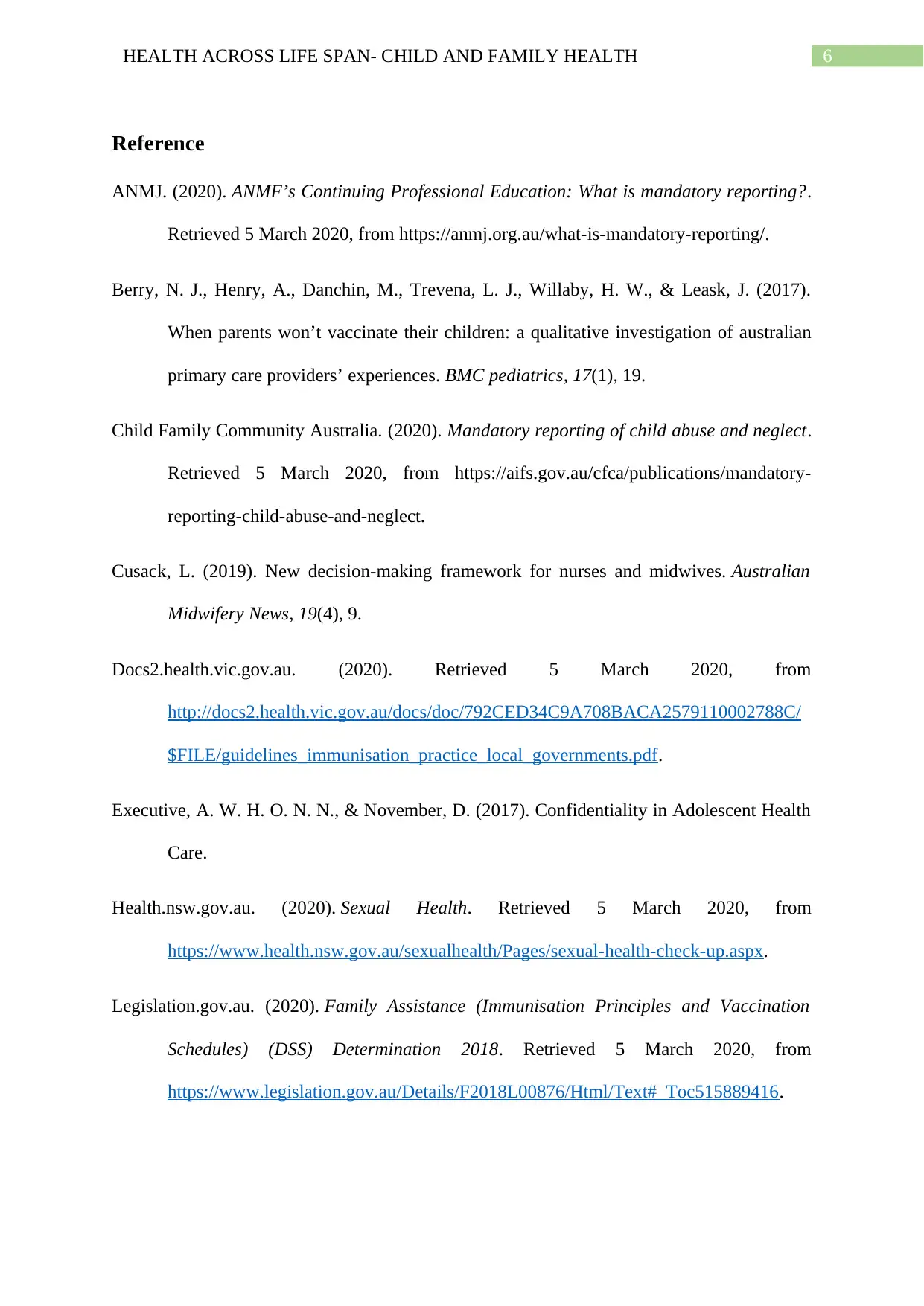
6HEALTH ACROSS LIFE SPAN- CHILD AND FAMILY HEALTH
Reference
ANMJ. (2020). ANMF’s Continuing Professional Education: What is mandatory reporting?.
Retrieved 5 March 2020, from https://anmj.org.au/what-is-mandatory-reporting/.
Berry, N. J., Henry, A., Danchin, M., Trevena, L. J., Willaby, H. W., & Leask, J. (2017).
When parents won’t vaccinate their children: a qualitative investigation of australian
primary care providers’ experiences. BMC pediatrics, 17(1), 19.
Child Family Community Australia. (2020). Mandatory reporting of child abuse and neglect.
Retrieved 5 March 2020, from https://aifs.gov.au/cfca/publications/mandatory-
reporting-child-abuse-and-neglect.
Cusack, L. (2019). New decision-making framework for nurses and midwives. Australian
Midwifery News, 19(4), 9.
Docs2.health.vic.gov.au. (2020). Retrieved 5 March 2020, from
http://docs2.health.vic.gov.au/docs/doc/792CED34C9A708BACA2579110002788C/
$FILE/guidelines_immunisation_practice_local_governments.pdf.
Executive, A. W. H. O. N. N., & November, D. (2017). Confidentiality in Adolescent Health
Care.
Health.nsw.gov.au. (2020). Sexual Health. Retrieved 5 March 2020, from
https://www.health.nsw.gov.au/sexualhealth/Pages/sexual-health-check-up.aspx.
Legislation.gov.au. (2020). Family Assistance (Immunisation Principles and Vaccination
Schedules) (DSS) Determination 2018. Retrieved 5 March 2020, from
https://www.legislation.gov.au/Details/F2018L00876/Html/Text#_Toc515889416.
Reference
ANMJ. (2020). ANMF’s Continuing Professional Education: What is mandatory reporting?.
Retrieved 5 March 2020, from https://anmj.org.au/what-is-mandatory-reporting/.
Berry, N. J., Henry, A., Danchin, M., Trevena, L. J., Willaby, H. W., & Leask, J. (2017).
When parents won’t vaccinate their children: a qualitative investigation of australian
primary care providers’ experiences. BMC pediatrics, 17(1), 19.
Child Family Community Australia. (2020). Mandatory reporting of child abuse and neglect.
Retrieved 5 March 2020, from https://aifs.gov.au/cfca/publications/mandatory-
reporting-child-abuse-and-neglect.
Cusack, L. (2019). New decision-making framework for nurses and midwives. Australian
Midwifery News, 19(4), 9.
Docs2.health.vic.gov.au. (2020). Retrieved 5 March 2020, from
http://docs2.health.vic.gov.au/docs/doc/792CED34C9A708BACA2579110002788C/
$FILE/guidelines_immunisation_practice_local_governments.pdf.
Executive, A. W. H. O. N. N., & November, D. (2017). Confidentiality in Adolescent Health
Care.
Health.nsw.gov.au. (2020). Sexual Health. Retrieved 5 March 2020, from
https://www.health.nsw.gov.au/sexualhealth/Pages/sexual-health-check-up.aspx.
Legislation.gov.au. (2020). Family Assistance (Immunisation Principles and Vaccination
Schedules) (DSS) Determination 2018. Retrieved 5 March 2020, from
https://www.legislation.gov.au/Details/F2018L00876/Html/Text#_Toc515889416.
Paraphrase This Document
Need a fresh take? Get an instant paraphrase of this document with our AI Paraphraser
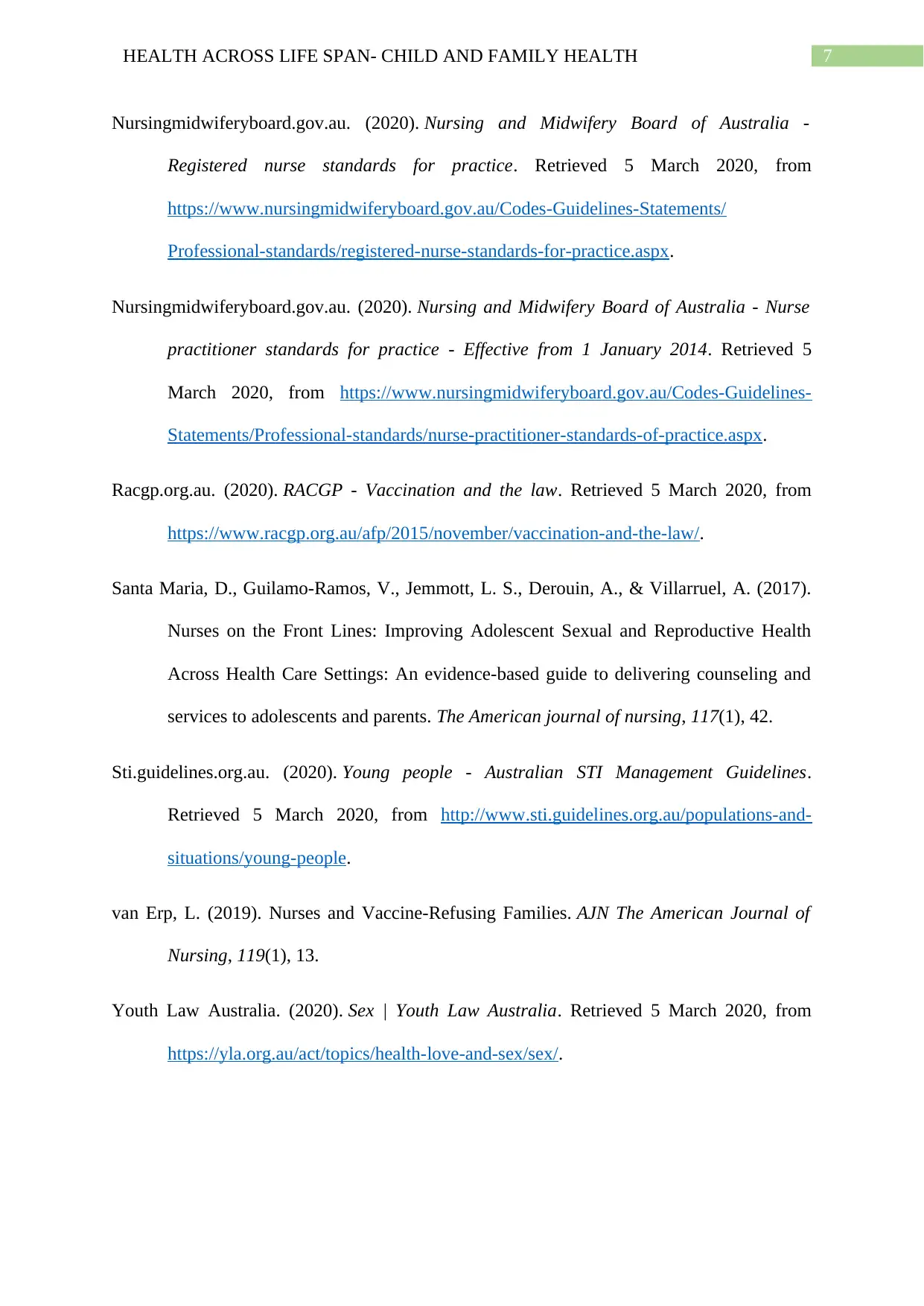
7HEALTH ACROSS LIFE SPAN- CHILD AND FAMILY HEALTH
Nursingmidwiferyboard.gov.au. (2020). Nursing and Midwifery Board of Australia -
Registered nurse standards for practice. Retrieved 5 March 2020, from
https://www.nursingmidwiferyboard.gov.au/Codes-Guidelines-Statements/
Professional-standards/registered-nurse-standards-for-practice.aspx.
Nursingmidwiferyboard.gov.au. (2020). Nursing and Midwifery Board of Australia - Nurse
practitioner standards for practice - Effective from 1 January 2014. Retrieved 5
March 2020, from https://www.nursingmidwiferyboard.gov.au/Codes-Guidelines-
Statements/Professional-standards/nurse-practitioner-standards-of-practice.aspx.
Racgp.org.au. (2020). RACGP - Vaccination and the law. Retrieved 5 March 2020, from
https://www.racgp.org.au/afp/2015/november/vaccination-and-the-law/.
Santa Maria, D., Guilamo-Ramos, V., Jemmott, L. S., Derouin, A., & Villarruel, A. (2017).
Nurses on the Front Lines: Improving Adolescent Sexual and Reproductive Health
Across Health Care Settings: An evidence-based guide to delivering counseling and
services to adolescents and parents. The American journal of nursing, 117(1), 42.
Sti.guidelines.org.au. (2020). Young people - Australian STI Management Guidelines.
Retrieved 5 March 2020, from http://www.sti.guidelines.org.au/populations-and-
situations/young-people.
van Erp, L. (2019). Nurses and Vaccine-Refusing Families. AJN The American Journal of
Nursing, 119(1), 13.
Youth Law Australia. (2020). Sex | Youth Law Australia. Retrieved 5 March 2020, from
https://yla.org.au/act/topics/health-love-and-sex/sex/.
Nursingmidwiferyboard.gov.au. (2020). Nursing and Midwifery Board of Australia -
Registered nurse standards for practice. Retrieved 5 March 2020, from
https://www.nursingmidwiferyboard.gov.au/Codes-Guidelines-Statements/
Professional-standards/registered-nurse-standards-for-practice.aspx.
Nursingmidwiferyboard.gov.au. (2020). Nursing and Midwifery Board of Australia - Nurse
practitioner standards for practice - Effective from 1 January 2014. Retrieved 5
March 2020, from https://www.nursingmidwiferyboard.gov.au/Codes-Guidelines-
Statements/Professional-standards/nurse-practitioner-standards-of-practice.aspx.
Racgp.org.au. (2020). RACGP - Vaccination and the law. Retrieved 5 March 2020, from
https://www.racgp.org.au/afp/2015/november/vaccination-and-the-law/.
Santa Maria, D., Guilamo-Ramos, V., Jemmott, L. S., Derouin, A., & Villarruel, A. (2017).
Nurses on the Front Lines: Improving Adolescent Sexual and Reproductive Health
Across Health Care Settings: An evidence-based guide to delivering counseling and
services to adolescents and parents. The American journal of nursing, 117(1), 42.
Sti.guidelines.org.au. (2020). Young people - Australian STI Management Guidelines.
Retrieved 5 March 2020, from http://www.sti.guidelines.org.au/populations-and-
situations/young-people.
van Erp, L. (2019). Nurses and Vaccine-Refusing Families. AJN The American Journal of
Nursing, 119(1), 13.
Youth Law Australia. (2020). Sex | Youth Law Australia. Retrieved 5 March 2020, from
https://yla.org.au/act/topics/health-love-and-sex/sex/.
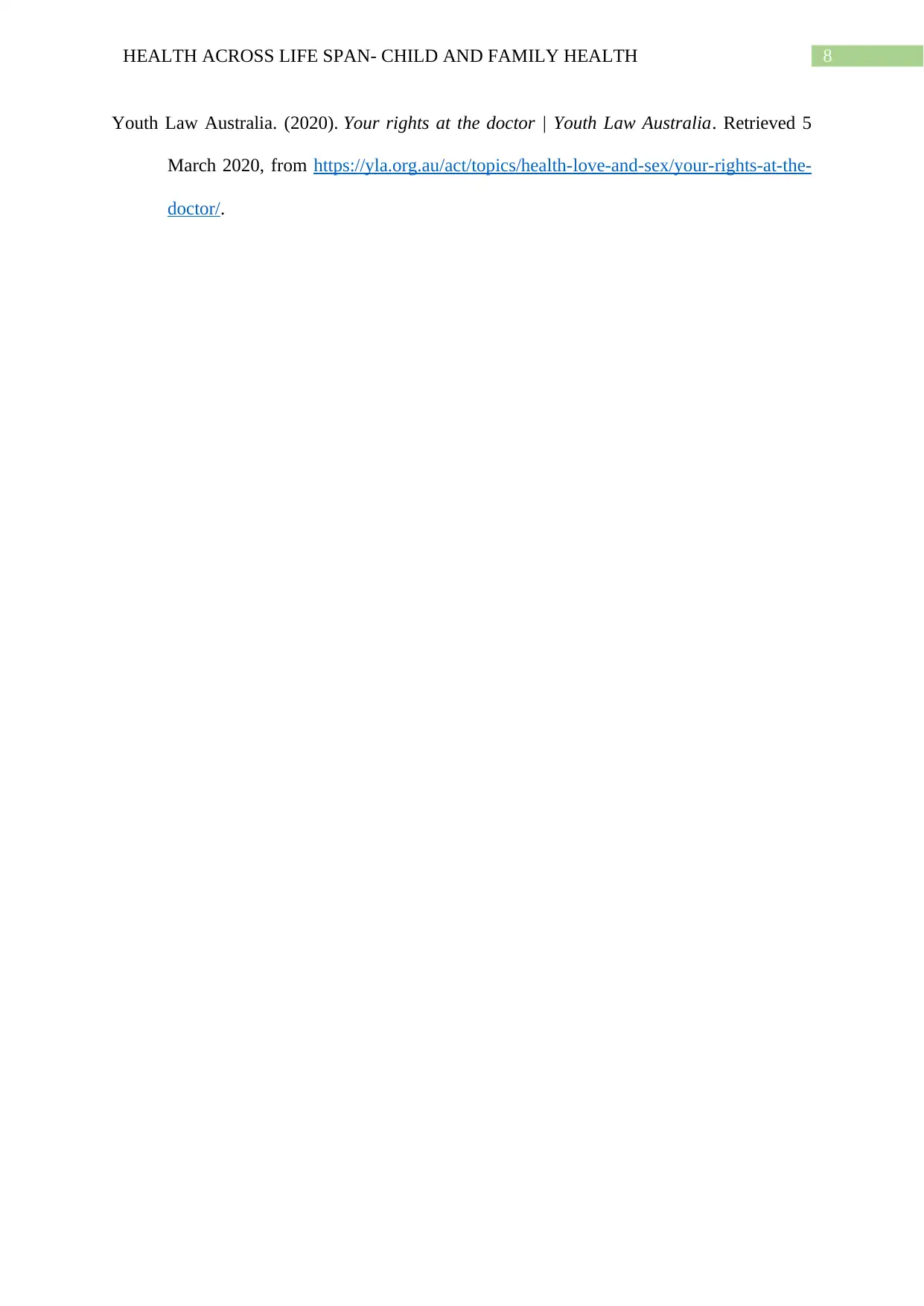
8HEALTH ACROSS LIFE SPAN- CHILD AND FAMILY HEALTH
Youth Law Australia. (2020). Your rights at the doctor | Youth Law Australia. Retrieved 5
March 2020, from https://yla.org.au/act/topics/health-love-and-sex/your-rights-at-the-
doctor/.
Youth Law Australia. (2020). Your rights at the doctor | Youth Law Australia. Retrieved 5
March 2020, from https://yla.org.au/act/topics/health-love-and-sex/your-rights-at-the-
doctor/.
⊘ This is a preview!⊘
Do you want full access?
Subscribe today to unlock all pages.

Trusted by 1+ million students worldwide
1 out of 9
Related Documents
Your All-in-One AI-Powered Toolkit for Academic Success.
+13062052269
info@desklib.com
Available 24*7 on WhatsApp / Email
![[object Object]](/_next/static/media/star-bottom.7253800d.svg)
Unlock your academic potential
Copyright © 2020–2026 A2Z Services. All Rights Reserved. Developed and managed by ZUCOL.





